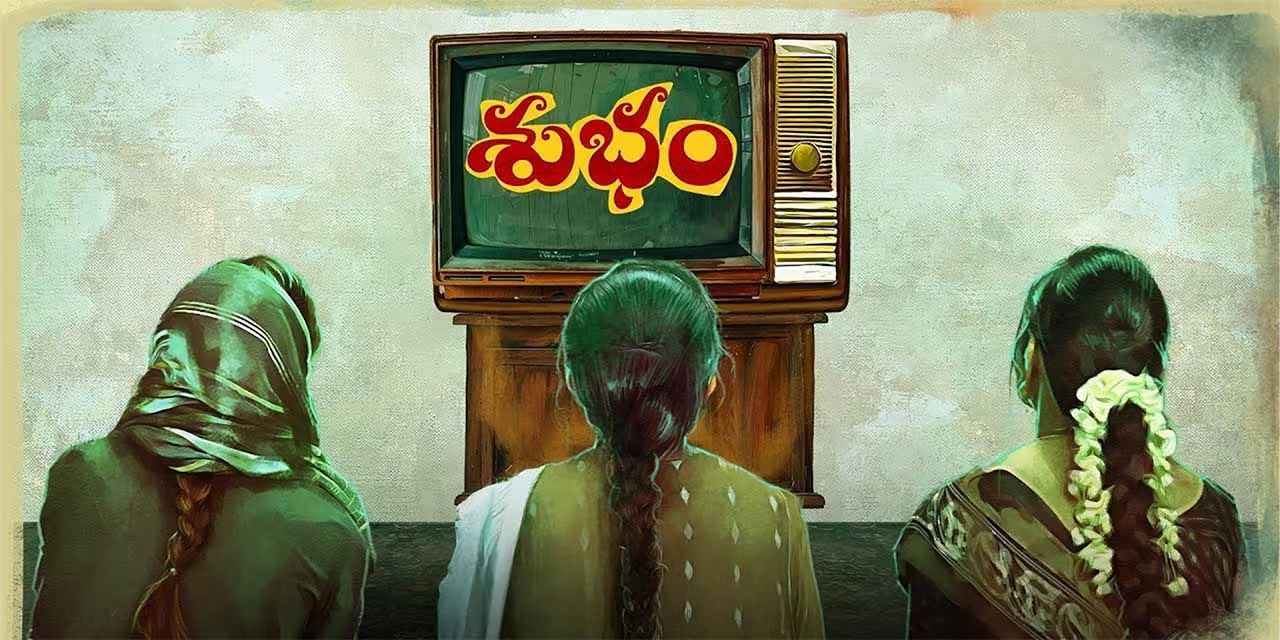Subtitle: A Nostalgic Horror-Comedy That Blends Ghostly Gags with Social Satire Subham
Introduction
Released on May 9, 2025, Subham marks the debut production venture of Samantha Ruth Prabhu under Tralala Moving Pictures. Directed by Praveen Kandregula and written by Vasanth Maringanti, this Telugu-language horror-comedy delves into the quirks of early 2000s Indian households, where television soap operas reigned supreme. Set against the backdrop of Bheemunipatnam in 2004, the film offers a satirical take on gender roles, marital dynamics, and the cultural phenomenon of daily soaps.The Times of India+6Wikipedia+6www.greatandhra.com+6Fandango+1Telugu Cinema+1
Plot Overview
The narrative centers on Srinu (Harshith Reddy), a local cable TV operator, who marries Srivalli (Shriya Kontham), a bank officer. On their wedding night, Srinu attempts to assert his dominance, influenced by his friends’ advice to embody the ‘alpha male’ archetype. However, his plans are thwarted when Srivalli becomes engrossed in a television serial titled Janma Janmala Bandham, revealing an unexpected, possibly supernatural facet to her personality. As Srivalli’s obsession with the serial intensifies, Srinu’s life spirals into chaos, leading to a series of comedic and eerie events that challenge traditional marital norms and gender expectations. News24+4Telugu Cinema+4www.greatandhra.com+4
Themes and Satire
Subham cleverly satirizes the early 2000s Indian obsession with television soap operas, highlighting how these shows influenced household dynamics and individual behaviors. The film explores themes of masculinity, control, and the societal pressures faced by newlyweds, particularly focusing on the expectations placed upon men to assert dominance in marital relationships. By intertwining elements of horror and comedy, the film sheds light on the absurdities of these societal norms, offering a critique that’s both humorous and thought-provoking. Cinema Express
Performances and Direction
Harshith Reddy delivers a commendable performance as Srinu, capturing the nuances of a man grappling with his insecurities and the unexpected challenges of married life. Shriya Kontham’s portrayal of Srivalli is equally compelling, seamlessly transitioning between a reserved newlywed and a woman possessed by an uncanny obsession. Director Praveen Kandregula, known for his previous work Cinema Bandi, brings a unique vision to Subham, blending humor with horror to craft a narrative that’s both entertaining and reflective. www.greatandhra.com+4Telugu Cinema+4FilmiBeat+4OTTPlay+5FilmiBeat+5Cinema Express+5
Music and Technical Aspects
The film’s music, composed by Shor Police with a background score by Vivek Sagar, complements the narrative’s tonal shifts, enhancing both the comedic and suspenseful moments. The cinematography by Mridul Sujit Sen captures the essence of a small-town setting, while Dharmendra Kakarala’s editing ensures a cohesive flow, maintaining audience engagement throughout the film’s runtime. Wikipedia+1www.greatandhra.com+1
Setting the Stage: The Year 2004 in Bheemunipatnam
The film takes place in a quaint town called Bheemunipatnam near Visakhapatnam in 2004. Here, Srinu (Harshith Reddy) is a humble, likable young man who runs a local cable network service. He is the kind of guy everyone knows—smiling, slightly clumsy, and full of dreams. He lives with his family and is constantly surrounded by his childhood friends, who give him dubious advice on manhood and marriage.
Srinu is set to marry Srivalli (Shriya Kontham), a smart, independent bank officer recently transferred to the town. Their arranged marriage starts off sweetly, with both partners cautiously stepping into their new life. However, Srinu is pressured by his friends to assert dominance over Srivalli and “be a man” in the marriage.
A Marriage Gone… Weird
On their wedding night, instead of romantic intimacy, Srinu is shocked when Srivalli is more interested in watching the daily soap Janma Janmala Bandham. He assumes it’s just nerves or a one-time distraction. But the pattern continues—every evening, Srivalli transforms into an intense, emotionally unrecognizable version of herself when the serial airs. Her voice changes, her expressions become exaggerated, and her language mimics the overly dramatic lines of the TV show.
At first, Srinu finds it funny. But soon, eerie things begin to happen: lights flicker at 7:30 PM when the serial starts, the television turns on by itself, and Srivalli’s mood swings are no longer within the realm of normal.
Is Srivalli possessed? Is the serial cursed? Or is it all in Srinu’s head?
The Ghost in the Machine (Or TV)
As Srinu investigates, he uncovers a bizarre tale. Years ago, a woman named Shubha, who was an ardent fan of Janma Janmala Bandham, died tragically during an episode’s broadcast. Her spirit, addicted to drama and validation, had nowhere to go—and legend has it that she began haunting television signals, particularly the serial that had defined her life.
Srinu begins suspecting that Srivalli is possessed by Shubha’s spirit every evening when the show airs. His friends, terrified but curious, suggest everything from exorcisms to removing the cable box. But Srinu wants to save both his wife and his marriage. Instead of fighting the haunting with fear, he decides to understand it.
Layers of Meaning: Beyond the Laughs
At its heart, Subham is more than just a ghost story. It cleverly critiques the toxic expectations placed on men to “control” their wives, the cultural obsession with soap operas that reinforce stereotypical gender roles, and the suppression of female identity within the institution of marriage.
Srivalli, whether possessed or not, represents a woman trying to retain her voice in a new relationship. The ghost, Shubha, becomes symbolic of all the suppressed desires, ignored voices, and dramatized versions of womanhood portrayed on television.
Critical Reception
Subham has received mixed reviews from critics and audiences alike. While some praise its innovative blend of horror and comedy, others feel that the film’s pacing falters in the second half. The film’s unique premise and social commentary have been lauded, though some critics believe that the execution could have been more polished. Overall, Subham stands out for its originality and the conversations it sparks about societal norms and media influence.
Conclusion
Subham offers a fresh take on the horror-comedy genre, intertwining societal critique with entertainment. Its exploration of gender roles, media influence, and marital dynamics provides depth beyond its comedic surface. While it may not resonate with all viewers, its originality and thematic boldness make it a noteworthy addition to contemporary Telugu cinema.







